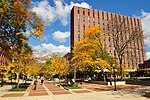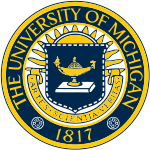The University of Michigan Library is the academic library system of the University of Michigan. The university's 38 constituent and affiliated libraries together make it the second largest research library by number of volumes in the United States.
As of 2019–20, the University Library contained more than 14,543,814 volumes, while all campus library systems combined held more than 16,025,996 volumes. As of the 2019–2020 fiscal year, the Library also held 221,979 serials, and over 4,239,355 annual visits.Founded in 1838, the University Library is the university's main library and is housed in 12 buildings with more than 20 libraries, among the most significant of which are the Shapiro Undergraduate Library, Hatcher Graduate Library, Special Collections Library, and Taubman Health Sciences Library. However, several U-M libraries are independent of the University Library: the Bentley Historical Library, the William L. Clements Library, the Gerald R. Ford Library, the Kresge Business Administration Library of the Ross School of Business, and the Law Library of the University of Michigan Law School. The University Library is also separate from the libraries of the University of Michigan–Dearborn (Mardigian Library) and the University of Michigan–Flint (Frances Willson Thompson Library).The University of Michigan was the original home of the JSTOR database, which contains about 750,000 digitized pages from the entire pre-1990 backfile of ten journals of history and economics. In December 2004, the University of Michigan announced a book digitization program in collaboration with Google (known as Michigan Digitization Project), which is both revolutionary and controversial. Books scanned by Google are included in HathiTrust, a digital library created by a partnership of major research institutions. As of March 2014, the following collections had been digitized: Art, Architecture and Engineering Library; Bentley Historical Library; Buhr Building (large portions); Dentistry Library (portions); Fine Arts Library (large portions); Hatcher Graduate Library (large portions); Herbarium Library; Kresge Business Administration Library; Law Library (portions); Museums Library; Music Library (large portions); Shapiro Undergraduate Library (large portions); Special Collections Research Library (portions); Taubman Health Sciences Library (large portions);
Responding to restricted public funding and the rising costs of print materials, the library has launched significant new ventures that use digital technology to provide cost-effective and permanent alternatives to traditional print publication. The University Library is also an educational organization in its own right, offering a full range of courses, resources, support, and training for students, faculty, and researchers.
The University Librarian and Dean of Libraries is Lisa R. Carter, whose term began on May 1, 2023.











